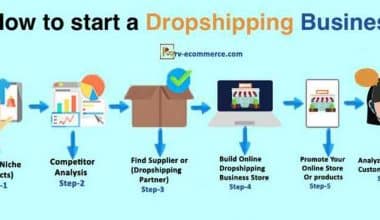An exciting endeavor is launching a business. But without careful planning, it’s simple to become overwhelmed by the procedure. With the one difference that you won’t need to lease commercial premises for your business, starting a business from home is very comparable to starting from elsewhere. To start and run a small business from home, there are ideas in selecting your structures to develop a marketing strategy that will bring in revenue. This guide will lead you on that.
How to Start a Small Business From Home
Although you can forgo looking for an office or retail location, a home business requires many of the same preparations as other businesses. It might be the ideal time for you to learn how to launch a small business from home if you’ve ever been interested in doing so. More people than ever before are working from home and starting their own businesses as a result of the global COVID-19 pandemic.
Like starting any business, starting a business from home has its advantages, but there are many steps to take before you can position yourself for success. We’ll walk you through each step of what you need to accomplish in this manual to learn how to launch a home company.
#1. Develop and Polish Your Business Concept
It’s likely that you already have an idea of the kind of business you want to begin if you’re thinking about how to launch a small business from home. If not, your initial action should be to define your notion. If you do have a business idea, you should polish it up before starting your online business.
#2. Plan Your Business
A business plan is essential for two reasons: it will help you describe your aims and objectives for the company, and it may be used to convince lenders and investors to fund your startup. Business plans can range in length and level of depth, but generally speaking, they will contain the following:
- Executive summary: your company’s “elevator pitch”
- An overview of your company and a more thorough description of what you do
- Competitive and market analysis
- Description of the main goods and services offered
- Plan for marketing and sales
- Budgetary proposals and financial forecasts
#3. Choose An Appropriate Business Entity
The legal structure of your company, such as a sole proprietorship, partnership, LLC, or corporation—each with advantages and disadvantages—must be decided.
Create Options For Business Names
One of the most enjoyable steps in the business creation process is choosing your company’s name. The overwhelming nature of it is another possibility. You want a name that communicates who you are and what you do to clients, consumers, competitors, and other market participants. You also want the name to be catchy and inventive so that it has impact.
#4. Register Your Business
You must register your company with the state government, frequently the Secretary of State, in the state where you intend to conduct business unless it is a single proprietorship. Based on the following, you will be regarded as “conducting business activities”:
- Being physically present in the state (i.e., the location of your home office)
- Meeting with clients in-person within the state
- Obtaining a sizeable amount of the business’s income within the state
- Workers are present in the state.
You might also need to seek foreign qualification in other jurisdictions where you conduct business if you want to conduct sales in states other than the one where your home firm is based. Most states need that a firm submit a Certificate of Authority with them as well as a Certificate of Good Standing from the state where it was founded in order to receive overseas qualification.
#4. Purchase a Business License
You must obtain a business license after registering your company. You might require licenses for the following things, depending on the sector in which your firm operates and the particular rules of your state, county, and municipality:
- Commercial license
- Zoning approval
- Seller’s license
- General permit for conducting business
- Federal permits
Don’t assume that just because you work as a consultant or freelancer, your company doesn’t require a license. Reviewing pertinent codes and rules is recommended. Consult a local company attorney if you have any questions.
#5. File IRS Form SS-4 To Obtain an EIN
Businesses that employ people or must file reports for excise taxes must obtain an Employer Identification Number (EIN). An EIN can be obtained in a short time and with little difficulty. You can submit a Form SS-4 online in order to request an EIN. You may declare business revenue using your Social Security number if you are a lone entrepreneur without workers.
#6. Organize Your Finances.
Depending on the kind of business you intend to start, you will have quite different financial requirements. To make sure you are financially prepared and to make a good impression on potential investors and lenders, you should establish a recommended budget and financial predictions.
#7. Think About Buying Business Insurance
There is no liability protection with a sole proprietorship or partnership, so you might want to think about getting business insurance to cover business-related liabilities. Depending on the nature of your business and whether you were created as an LLC or corporation, which both provide personal liability protection, you might want to think about getting business insurance.
#8. Develop A Marketing and Sales Strategy.
You might want to make a marketing and sales plan before starting your home business so that you are prepared for success. Think on how potential clients and customers will learn about you. Look into your network to see who might be a possible client or customer or who might be able to spread the word about your company. Additionally, consider whether your budget allows for advertising, marketing supplies, or sales training.
Cheapest Business to Start From Home
The high startup costs for a lot of people with an entrepreneurial drive are the main deterrent from pursuing their business ambitions. However, if you are committed and put in some good ol’ fashioned hard work, you may start numerous enterprises today with little funding. These concepts will encourage your entrepreneurial zeal if you wish to launch a low-cost firm. Below are some cheapest business to start from home:
#1. Event Planning Services
You might have the ideal disposition to start an event planning company if you’re a highly organized, meticulous person who enjoys throwing events. Event planners make it simple for people to throw a fun celebration by working for weddings, birthday parties, and class reunions. Build up a strong vendor and contact database via LinkedIn and cold calling so you can assist your clients in planning the event of their dreams.
#2. Professional Reviewer
Yes, there truly is such a thing. Companies big and small have not overlooked the value of positive ratings. Many businesses give people their goods and services in exchange for reviews of the business. They seek positive reviews, but they also prioritize candid ones. You get paid while trying new things, reading new books, experimenting with the newest technology, and much more. They pay for your time or by the review.
Larger firms can employ a full-time employee or an agency to manage their Facebook, Twitter, and blogs, but small businesses sometimes have to do their own social media marketing. Business owners could be too busy or overburdened by their other obligations to develop a strong social media strategy.
#4. Content Creation
For creative professionals like writers and graphic designers, that can use their skills to produce high-quality, shareable content for businesses and media outlets, social media and the 24-hour news cycle have created the ideal storm of opportunity.
#5. Online Education and Coaching
What do you feel strongly about? Yoga? Baking? web development? If you are an expert at anything, you can teach online lessons to help others improve their life. Make videos and packets of information that may be downloaded, or arrange for clients to have live Skype classes. A home-based or online tutoring business is another choice for ambitious instructors.
#6. Dedicated Chef
Strong cooking abilities and a solid understanding of nutrition and special diets are a requirement for this line of work since you will be required to plan and prepare weekly or daily meals for your clients. Even if you haven’t attended culinary school, having some experience in the kitchen will help you look more professional.
#7. Etsy Shop
The well-known online marketplace Etsy is home to thousands of small-scale businesses and larger enterprises, like the highly regarded Wildflower + Co., which sells jewelry, patches, and DIY goods. The cost of opening an Etsy shop is really low. Although there are three selling fees (the listing, transaction, and payment processing fees), joining the site and opening a business are both free.
How to Run a Business From Home Legally
Having a plan can help you avoid typical errors and enhance success, whether you’re the lone employee or managing remote workers for your new business. Check out these suggestions on how to run and build a strong foundation for your new business from home legally.
#1. Do Some Legal Research
You are responsible for learning about all the rules and regulations in your area because state and municipal laws on operating a home company differ greatly. Even if you were unaware of the restrictions, breaking them could result in legal action being taken against your company.
#2. Consider it A Legitimate Business.
Treat your home-based business seriously from the start, not merely as a fun side hustle or hobby. Make a business plan and timetable so that you have time set aside for work. Create a separate company bank account, and keep thorough records of all of your business expenditures.
#3. Separate Lives For Work and Home
If you can, designate a room as the headquarters for your home business so you may close the door and maintain physical separation. Create a designated office space in another room if you are unable to take over the entire space. Set limits for yourself to separate your personal and professional lives.
#4. Don’t Be Distracted
When you run a business from your home, there are always distractions around, such as children who require your attention or dirty laundry that needs to be done. While you can’t completely eliminate distractions, you may lessen them by removing them from your area or installing soundproofing in your office.
#5. Make A Policy for Remote Work
Create a remote work policy to spell out your expectations if you’re beginning a home-based firm with employees. Include rules for the hours that must be worked, your availability, the frequency, and how to communicate.
Advantages of Operating A Home-Based Business
Choosing to operate a business from home opens up entrepreneurship to those who lack the funds to launch a conventional brick-and-mortar enterprise. The following are some advantages of operating a business from home:
- No commute: By working from home, you are already at your place of employment, saving you both time and money on the commute.
- Reduced startup costs Even though you don’t need to lease or acquire a commercial space, a home-based business still has startup fees for supplies, marketing, and other charges. This lower overhead can enhance profitability and make starting a firm more realistic.
- Income tax advantages: You may be eligible for income tax reductions if you have a dedicated office space that is only utilized by your company.
- Flexible time slots: You can work more when you don’t have to commute. You can fit work time around commitments to your family because your workplace is always open. It’s simpler to juggle home responsibilities with business operations, including picking up the kids from school or making dinner.
- No workplace politics: When you work alone, you won’t have to worry about office politics or water-cooler rumors that could disrupt your productivity.
Small Business Ideas From Home
Starting a home-based business is getting easier and easier as more and more enterprises move online. There are countless ways to launch a successful home business, regardless of whether your goal is to do so in addition to or in instead of regular work. Here are some ideas on small business you can start from home.
#1. Virtual Assistant Business
Other business owners and executives can get assistance from a virtual assistant (VA) with some of the chores involved in running a business. Certain services are provided to these executives by a virtual assistant company for an hourly or package fee. Services could include scheduling appointments, managing social media accounts, and creating blogs. In order to be a successful VA, you must be well-organized and possess the necessary skills to meet the needs of your clients.
#2. Recruiting Agency
Excellent applicants for available roles at other companies are sourced by recruiting or staffing firms. Many firms are prepared to compensate recruiters who are successful in locating them the ideal applicant for their available roles because hiring employees can be a very time-consuming and expensive procedure.
#3. Property Watch Service
If you reside in a region with a lot of vacation or second homes and are knowledgeable about home services, you might want to think about launching a property watch company. Although services vary depending on the supplier, many property watch companies monitor vacant properties, such as vacation houses over the winter or while owners are away.
#4. Print-on-Demand Business
Typically, a print-on-demand company sells T-shirts, hats, various types of clothing, and home products. Since the things are printed when they are purchased, the business owner does not need to keep inventory. Because they are manufactured to order, you avoid the trouble and expense of purchasing and keeping goods for sale.
#5. Sell Online Classes
You might be able to develop and instruct an online course if you are an expert in a particular field. This could be a yoga or marketing class. There are countless options for courses. Those beginning an online course should be subject matter experts with extensive hands-on knowledge in the subject matter. To teach an online course, you don’t require any particular credentials, though.
#8. Sell Homemade Products
Perhaps you enjoy making original soaps or have a fantastic barbecue sauce recipe. This might be your upcoming business venture. Many entrepreneurs are successful in converting a pastime into a business. Keep in mind that starting a business will involve expenses because you’ll need to produce things and stock up on supplies to sell to customers. Depending on the price of your goods and how much inventory you intend to keep on hand, the investment amount will change.
#9. Open a Dropshipping Business
Dropshipping has the advantage of allowing you to sell almost anything without having to purchase inventory. In a dropshipping business strategy, you locate a wholesaler who will package and deliver the goods to your customers after a sale is confirmed. In these deals, you only operate as the marketer and service agent; the goods actually come straight from the distributor.
How Can I Start a Business With No Money and No Experience?
How to Launch a Business From Nothing
- Begin with a solid business concept.
- Perform Research on Your Business Concept.
- Develop a business plan.
- Officialize your new business.
- Understand your finances, safeguard your company, and build your company.
Related Posts
- NETWORK SYSTEMS MANAGEMENT: How It Works
- HOW MUCH IS A BUSINESS LICENSE: What You Need To Know and Free Tips
- How to get a Business License in Texas: Step-by-Step Guide
- What Is a Short Sale? Guide To The Short Sale Process






